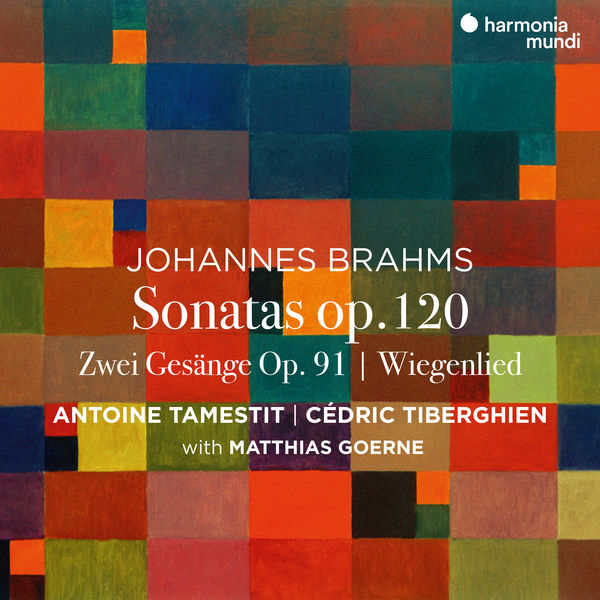
Streaming ilimitado
Escute agora este álbum em alta qualidade nos nossos aplicativos
Iniciar meu período de teste e começar a escutar este álbumCurta este álbum nos aplicativos Qobuz com a sua assinatura
AssinarCurta este álbum nos aplicativos Qobuz com a sua assinatura
It's hard to imagine how anything could have been improved upon with this Brahms recital from three of Harmonia Mundi's most sensitive and interesting artists.
The programming alone is a work of art: the idea of pairing the viola versions of Brahms's two autumnal Op. 120 Clarinet Sonatas inspired by Meiningen Orchestra clarinettist Richard Mühlfeld, with three further softly intimate works of his showcasing the viola's similarities with the human voice – viola and piano arrangements of Nachtigall from the six Op. 97 Songs (extra resonant, when Brahms described Mühlfeld as the nightingale of the orchestra) and the famous Op. 49 Wiegenlied, followed by the Op. 91 Zwei Gesänge for Voice, Viola and Piano.
Then there's the instruments, because for Tamestit and Tiberghien these are just as important to the music's alchemy as the abilities of the performers, and their quest to find the perfect match for the penetrating, multi-shaded tones of Tamestit's Stradivarius viola eventually led them to an 1899 Bechstein piano. The result was two instruments capable of a range of colours and roundness of sound across all registers and through even the most virtuosic of passages; and that's precisely what you hear across the resultant lyrically tender, natural-feeling readings, because beyond the hand in glove chamber partnering you're hearing, their respective tones are both alive with colouristic complexities and verily glowing.
Then, beyond being simply delicious, the vocal quality Tamestit draws out from the famous Wiegenlied melody serves as the perfect overture to the programme's Zwei Gesänge – shaped icing on the cake – yet another perfect combination, Tamestit's lines lovingly encircling and dovetailing with Goerne's own richly warm, gentle baritone, the polished Teldex Studio engineering casting them on satisfyingly equal footings with each other, with the piano just slightly behind.
In short, absolutely gorgeous. © Charlotte Gardner/Qobuz
Você está escutando amostras.
Escute mais de 100 milhões de músicas com um plano de streaming ilimitado.
Escute esta playlist e mais de 100 milhões de músicas com os nossos planos de streaming ilimitado.
A partir de 8,99€/mês

Viola Sonata in F Minor, Op. 120 No. 1 (Johannes Brahms)
Johannes Brahms, Composer - Antoine Tamestit, Viola, MainArtist - Cédric Tiberghien, Piano, MainArtist
2020 harmonia mundi 2020 harmonia mundi
Johannes Brahms, Composer - Antoine Tamestit, Viola, MainArtist - Cédric Tiberghien, Piano, MainArtist
2020 harmonia mundi 2020 harmonia mundi
Johannes Brahms, Composer - Antoine Tamestit, Viola, MainArtist - Cédric Tiberghien, Piano, MainArtist
2020 harmonia mundi 2020 harmonia mundi
Johannes Brahms, Composer - Antoine Tamestit, Viola, MainArtist - Cédric Tiberghien, Piano, MainArtist
2020 harmonia mundi 2020 harmonia mundi
Johannes Brahms, Composer - Antoine Tamestit, Arranger, Viola, MainArtist - Cédric Tiberghien, Piano, MainArtist
2020 harmonia mundi 2020 harmonia mundi
Viola Sonata in E-Flat Major, Op. 120 No. 2 (Johannes Brahms)
Johannes Brahms, Composer - Antoine Tamestit, Viola, MainArtist - Cédric Tiberghien, Piano, MainArtist
2020 harmonia mundi 2020 harmonia mundi
Johannes Brahms, Composer - Antoine Tamestit, Viola, MainArtist - Cédric Tiberghien, Piano, MainArtist
2020 harmonia mundi 2020 harmonia mundi
Johannes Brahms, Composer - Antoine Tamestit, Viola, MainArtist - Cédric Tiberghien, Piano, MainArtist
2020 harmonia mundi 2020 harmonia mundi
Johannes Brahms, Composer - Antoine Tamestit, Arranger, Viola, MainArtist - Cédric Tiberghien, Piano, MainArtist
2020 harmonia mundi 2020 harmonia mundi
Johannes Brahms, Composer - Antoine Tamestit, Viola, MainArtist - Matthias Goerne, MainArtist, BaritoneVocals - Cédric Tiberghien, Piano, MainArtist
2020 harmonia mundi 2020 harmonia mundi
Johannes Brahms, Composer - Antoine Tamestit, Viola, MainArtist - Matthias Goerne, MainArtist, BaritoneVocals - Cédric Tiberghien, Piano, MainArtist
2020 harmonia mundi 2020 harmonia mundi
Resenha do Álbum
It's hard to imagine how anything could have been improved upon with this Brahms recital from three of Harmonia Mundi's most sensitive and interesting artists.
The programming alone is a work of art: the idea of pairing the viola versions of Brahms's two autumnal Op. 120 Clarinet Sonatas inspired by Meiningen Orchestra clarinettist Richard Mühlfeld, with three further softly intimate works of his showcasing the viola's similarities with the human voice – viola and piano arrangements of Nachtigall from the six Op. 97 Songs (extra resonant, when Brahms described Mühlfeld as the nightingale of the orchestra) and the famous Op. 49 Wiegenlied, followed by the Op. 91 Zwei Gesänge for Voice, Viola and Piano.
Then there's the instruments, because for Tamestit and Tiberghien these are just as important to the music's alchemy as the abilities of the performers, and their quest to find the perfect match for the penetrating, multi-shaded tones of Tamestit's Stradivarius viola eventually led them to an 1899 Bechstein piano. The result was two instruments capable of a range of colours and roundness of sound across all registers and through even the most virtuosic of passages; and that's precisely what you hear across the resultant lyrically tender, natural-feeling readings, because beyond the hand in glove chamber partnering you're hearing, their respective tones are both alive with colouristic complexities and verily glowing.
Then, beyond being simply delicious, the vocal quality Tamestit draws out from the famous Wiegenlied melody serves as the perfect overture to the programme's Zwei Gesänge – shaped icing on the cake – yet another perfect combination, Tamestit's lines lovingly encircling and dovetailing with Goerne's own richly warm, gentle baritone, the polished Teldex Studio engineering casting them on satisfyingly equal footings with each other, with the piano just slightly behind.
In short, absolutely gorgeous. © Charlotte Gardner/Qobuz
Sobre o álbum
- 1 disco(s) - 11 faixa(s)
- Duração total: 00:56:16
- 1 Folheto digital
- Artistas principais: Antoine Tamestit Cédric Tiberghien Matthias Goerne
- Compositor: Johannes Brahms
- Gravadora: harmonia mundi
- Género: Clássica Música de câmara
2020 harmonia mundi 2020 harmonia mundi
Melhorar as informações do álbum
